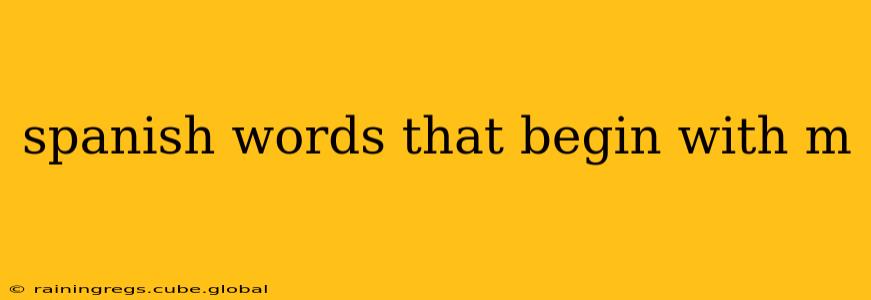Learning a new language can be a rewarding experience, and mastering vocabulary is a crucial step. This guide delves into the rich tapestry of Spanish words starting with the letter "M," exploring various categories and providing helpful examples. We'll cover common words, less frequent ones, and even explore some regional variations to give you a well-rounded understanding.
Common Spanish Words Starting with "M"
Let's begin with words you're likely to encounter frequently in everyday conversations and readings:
- Mano (hand): This is a fundamental word, used extensively in various contexts. You might say “Dame la mano” (Give me your hand).
- Mesa (table): Another ubiquitous word, referring to the furniture piece we eat at or work on. “La comida está sobre la mesa.” (The food is on the table.)
- Mucho (much/a lot): This adverb modifies verbs and adjectives, expressing quantity or intensity. “Tengo mucho trabajo.” (I have a lot of work.)
- Madre (mother): A simple yet powerful word representing a fundamental family relationship.
- Más (more): This adverb compares quantities or qualities. “Quiero más agua.” (I want more water.)
- Mal (bad/ill): This adjective describes something negative or unfavorable. “Me siento mal.” (I feel bad/sick.)
- Mar (sea): Evokes images of the vast ocean. “El mar es hermoso.” (The sea is beautiful.)
- Mañana (morning/tomorrow): Indicates the time of day or the following day. “Nos vemos mañana.” (See you tomorrow.)
Less Common, But Useful, Spanish Words Beginning with "M"
Moving beyond the basics, here are some words you might encounter less frequently, but which add depth to your Spanish vocabulary:
- Misterio (mystery): This word relates to something enigmatic or unexplained.
- Magia (magic): This refers to enchanting or supernatural abilities.
- Momento (moment): Describes a brief period of time.
- Moneda (coin): Refers to a form of currency.
- Música (music): A term for artistic sound.
- Mensaje (message): A communication sent to someone.
- Mejor (better): Compares two things, indicating superiority.
Exploring Regional Variations: Spanish Words Beginning with "M"
The beauty of the Spanish language lies in its regional variations. While many words are universal, some have unique forms or meanings depending on the country or region. Researching regional dialects can significantly enrich your understanding. For example, certain slang terms or colloquialisms starting with "M" might be prevalent in specific areas.
What are some examples of Spanish words that start with "M" and relate to food?
Many Spanish words starting with "M" relate to food! Think of manzana (apple), maíz (corn), miel (honey), mango (mango), and margarita (a cocktail, but with a fruit namesake). Exploring food-related vocabulary is a great way to expand your knowledge while also learning about different cultures.
What are some examples of Spanish words that start with "M" and relate to feelings or emotions?
The Spanish language offers rich vocabulary for describing feelings. Words like miedo (fear), malestar (discomfort), melancolía (melancholy), and maravilla (wonder) all begin with "M" and convey different emotional states.
How many Spanish words start with the letter "M"?
It’s difficult to give an exact number of Spanish words that begin with “M” as dictionaries vary and new words are always being coined. However, it's safe to say there are thousands of words beginning with this letter, reflecting the language's richness and depth.
This guide provides a starting point for exploring the vast world of Spanish words beginning with "M." Continue your exploration through dictionaries, language learning apps, and immersion in the language itself to further enrich your vocabulary and understanding. Remember that consistent practice is key to mastering any language!
